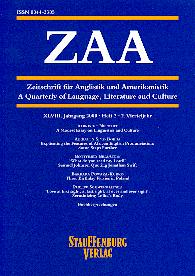|
Herausgeber
Herausgeber
Herausgeber
Herausgeber
Aus dem Inhalt:
Albrecht Neubert: A Modest Essay on
Linguistics and Culture
Augustin Simo Bobda : Explicating
the Features of African English Pronunciation: Some Steps Further (abstract)
Gottfried Graustein:
‘What do you read my Lord?’ Samuel Johnson Quoting Jonathan Swift (abstract)
Barbara Powaza-Kuko:
Three Birthday Parties in Poland (abstract)
Philipp Schweighauser:
‘Love at first sight, at last sight, at ever and ever sight’: Scrutinizing
Lolita’s Body (abstract)
Buchbesprechungen
-
Burkhard Dretzke. Modern British and American English
Pronunciation: A Basic Textbook. (Klaus Hansen)
-
Morton
Benson, Evelyn Benson and Robert Ilson. The BBI Dictionary of English Word
Combinations. (Klaus Hansen)
-
Howard Richler. Take my Words: A Wordaholic’s Guide to the English Language. (Klaus-Dieter
Barnickel)
-
Pavol
Štekauer. An Onomasiological Theory of English Word-Formation. (Klaus
Hansen)
-
Magnus
Ljung, ed. Corpus-based Studies in English. (Michael Klotz)
-
Jeffrey Kallen, ed. Focus on Ireland. (Piotr
Stalmaszczyk)
-
Jon Erickson and Marion Gymnich. Grundkurs Anglistische
Sprachwissenschaft & John F. Davis. Phonetics and Phonology. (Klaus Hansen)
-
Ulrich Bielefeld and Gisela Engel, eds. Bilder der
Nation: Kulturelle und politische Konstruktionen des Nationalen am Beginn
der europäischen Moderne. (Christian Schmitt-Kilb)
-
Sven Strasen. Poststrukturalismusrezeption in der
neueren marxistischen Literaturtheorie. (Peter Kuczynski)
-
Holger Klein, Sabine Coelsch-Foisner and Wolfgang Görtschacher,
eds. Poetry Now:
Contemporary British and Irish Poetry in
the Making. (Frank J. Kearful)
-
William
L. Andrews et al., eds. The Oxford Companion to African American
Literature. (Heiner Bus)
-
Robert
Cook. Sweet Land of Liberty? The African-American Struggle for Civil Rights
in the Twentieth Century. (Antje Kley)
-
Gabriele Hansen. Das reduzierte Leben: Leid und Leidbewältigung
im Werk Sarah Orne Jewetts. (Angelika Köhler)
-
Walter Bigler. Figures of Madness in Saul Bellow’s Longer
Fiction. (Dirk Padeken)
Abstract, Augustin simo Bobda: Explicating the
Features of African English Pronunciation: Some Steps Further.
After reviewing the traditional approach to
the perception, analysis and explication of deviations in African Englishes,
this paper, which focuses on pronunciation, suggests new grounds to explore.
These grounds include a reconsideration of the colonial input and an exploration
of non-classic intralingual factors like vowel assimilation, the interaction
between deviant spelling and deviant pronunciation which, indeed, account for a
large number of deviations. They
also include sui generis processes. Finally, the paper stresses the
context of learning which does not make the native English model available to
the African learner. This particular parameter leads to a reconsideration of
Selinker’s (1972) notion of interlanguage which is shown to be inapplicable to
the study of features of African English
pronunciation.
Abstract, Gottfried Graustein: ‘What do you read my
Lord?’ Samuel Johnson Quoting Jonathan Swift.
Following his principle of inserting in his
Dictionary of the English Language genuine quotations from earlier and
contemporary texts in order to illustrate the various entries, Samuel Johnson
included a considerable number of extracts from Jonathan Swift’s works. These
quotations from Swift were extracted from the CD-ROM edition of the dictionary
and checked with the help of an electronic corpus of Swift’s writings. This
yields various interesting insights into the lexicographer’s type and range of
reading. The idea is mainly to view Johnson, who was a voracious reader (and not
a friend of Swift), as part of the 18th-century scene or establishment, and to
obtain less subjective information on the reception of Swift in this context.
Studies of this kind are not intended to replace other, direct approaches to
writers and writings through biographical, linguistic or sociological
investigations, but rather serve as supporting
evidence.
Abstract, Barbara
PowaZa-Kurko: Three
Birthday Parties in Poland.
Harold Pinter wrote his first full-time play
The Birthday Party in 1957. Only one critic dared to defend it when it
was staged at the Lyric Theatre in London a year later. By the time the play
reached Polish stages “the most original, disturbing and arresting talent” of
the playwright had been widely recognized. But there were at least two factors
which hindered the triumphant entrance of the play in Poland: literary and
theatrical tradition and the compulsory communist ideology. They could distort
the play, but they could also add new insights and enrich its recep-tion.
The article analyses three performances of the Birthday Party in
view of the abovementioned factors. The productions under consideration were
spaced out in such a way that almost a decade elapsed between each of them
(1966, 1977, 1984). That is why I also examine the changes in sensibility, mentality and the
perception of foreign culture that account for different receptions of each of
the performances.
Abstract, philipp Schweighauser: ‘Love at first sight, at
last sight, at ever and ever sight’: Scrutinizing Lolita’s Body.
This article examines some of the
more disquieting strains in Nabokov’s Lolita. It argues that the novel’s
field of vision is structured in a way that links Humbert’s gaze with his filmic
and photographic imagination. More general reflections on the nature of
cinematography and photography lead to a reconsideration of Lolita’s premature
death as a literalization of the more sinister implications of Humbert’s
artistic aspirations. Humbert’s modernist quest for knowledge is shown to
coincide with a cinematic and photographic discourse that engulfs Lolita in a
semantic web of death. It will be argued that Lyne’s recent cinematic adaptation
of the novel lacks precisely in its omis-sion of these morbid
undertones.
|


